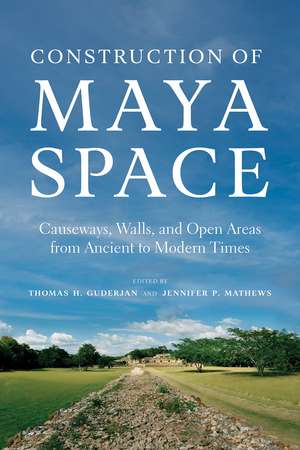Construction of Maya Space: Causeways, Walls, and Open Areas from Ancient to Modern Times
Editat de Thomas H. Guderjan, Jennifer P. Mathewsen Limba Engleză Hardback – 7 noi 2023
Construction of Maya Spaces sheds new light on how Maya society may have shaped—and been shaped by—the constructed environment. Moving beyond the towering pyramids and temples often associated with Maya spaces, this volume focuses on how those in power used features such as walls, roads, rails, and symbolic boundaries to control those without power, and how the powerless pushed back.
Through fifteen engaging chapters, contributors examine the construction of spatial features by ancient, historic, and contemporary Maya elite and nonelite peoples to understand how they used spaces differently. Through cutting-edge methodologies and case studies, chapters consider how and why Maya people connected and divided the spaces they used daily in their homes, in their public centers, in their sacred places such as caves, and across their regions to inform us about the mental constructs they used to create their lives and cultures of the past.
Contributors
Elias Alcocer Puerto
Alejandra Alonso Olvera
Traci Ardren
Jaime J. Awe
Alejandra Badillo Sánchez
Nicolas C. Barth
Grace Lloyd Bascopé
Adolpho Iván Batún-Alpuche
Elizabeth Beckner
M. Kathryn Brown
Bernadette Cap
Miguel Covarrubias Reyna
Juan Fernandez Diaz
Alberto G. Flores Colin
Thomas H. Guderjan
C. Colleen Hanratty
Héctor Hernández Álvarez
Scott R. Hutson
Joshua J. Kwoka
Whitney Lytle
Aline Magnoni
Jennifer P. Mathews
Stephanie J. Miller
Shawn G. Morton
Holley Moyes
Shannon Plank
Dominique Rissolo
Patrick Rohrer
Carmen Rojas Sandoval
Justine M. Shaw
J. Gregory Smith
Travis W. Stanton
Karl A. Taube
Daniel Vallejo-Cáliz
Through fifteen engaging chapters, contributors examine the construction of spatial features by ancient, historic, and contemporary Maya elite and nonelite peoples to understand how they used spaces differently. Through cutting-edge methodologies and case studies, chapters consider how and why Maya people connected and divided the spaces they used daily in their homes, in their public centers, in their sacred places such as caves, and across their regions to inform us about the mental constructs they used to create their lives and cultures of the past.
Contributors
Elias Alcocer Puerto
Alejandra Alonso Olvera
Traci Ardren
Jaime J. Awe
Alejandra Badillo Sánchez
Nicolas C. Barth
Grace Lloyd Bascopé
Adolpho Iván Batún-Alpuche
Elizabeth Beckner
M. Kathryn Brown
Bernadette Cap
Miguel Covarrubias Reyna
Juan Fernandez Diaz
Alberto G. Flores Colin
Thomas H. Guderjan
C. Colleen Hanratty
Héctor Hernández Álvarez
Scott R. Hutson
Joshua J. Kwoka
Whitney Lytle
Aline Magnoni
Jennifer P. Mathews
Stephanie J. Miller
Shawn G. Morton
Holley Moyes
Shannon Plank
Dominique Rissolo
Patrick Rohrer
Carmen Rojas Sandoval
Justine M. Shaw
J. Gregory Smith
Travis W. Stanton
Karl A. Taube
Daniel Vallejo-Cáliz
Preț: 514.17 lei
Preț vechi: 634.79 lei
-19% Nou
Puncte Express: 771
Preț estimativ în valută:
98.38€ • 102.100$ • 81.41£
98.38€ • 102.100$ • 81.41£
Carte indisponibilă temporar
Doresc să fiu notificat când acest titlu va fi disponibil:
Se trimite...
Preluare comenzi: 021 569.72.76
Specificații
ISBN-13: 9780816551873
ISBN-10: 0816551871
Pagini: 444
Ilustrații: 87 b&w illustrations, 8 tables
Dimensiuni: 152 x 229 x 43 mm
Greutate: 0.79 kg
Editura: University of Arizona Press
Colecția University of Arizona Press
ISBN-10: 0816551871
Pagini: 444
Ilustrații: 87 b&w illustrations, 8 tables
Dimensiuni: 152 x 229 x 43 mm
Greutate: 0.79 kg
Editura: University of Arizona Press
Colecția University of Arizona Press
Notă biografică
Thomas H. Guderjan is an archaeologist, a professor of anthropology, and the chair of the Department of Social Sciences at the University of Texas at Tyler.
Jennifer P. Mathews is a historical Maya archaeologist, an award-winning professor of anthropology, and chair of the Department of Sociology and Anthropology at Trinity University in San Antonio.
Jennifer P. Mathews is a historical Maya archaeologist, an award-winning professor of anthropology, and chair of the Department of Sociology and Anthropology at Trinity University in San Antonio.
Recenzii
“Construction of Maya Space includes chapters with a fresh examination of settlement patterns, drawing on the expertise of Maya archaeologists, ethnographers, and historians who provide case studies from their field research. This edited volume updates the discussion of defensive walls, broadens perspectives on how causeways link and separate, and the ritual, economic, and political uses of constructed features and spaces beyond buildings.”—Heather McKillop, author of Maya Salt Works
“How ancient peoples used, integrated, and divided space is of paramount interest for archaeological interpretation. This volume analyzes walls, roadways, buildings, and other constructions that the ancient Maya used to spatially define their landscapes. The chapters in this volume aptly demonstrate how such remnant features can be used to contextualize social and ritual interactions, making possible a broader understanding of both the past and the present.”—Arlen F. Chase, co-editor of Maya Kingship: Rupture and Transformation from Classic to Postclassic Times
“Like many similar volumes, this one is of real use for scholars looking for comparative case studies in cave archaeology, LiDAR studies, and studies of ancient residential house lots in Northern Yucatan.”—CHOICE connect
“How ancient peoples used, integrated, and divided space is of paramount interest for archaeological interpretation. This volume analyzes walls, roadways, buildings, and other constructions that the ancient Maya used to spatially define their landscapes. The chapters in this volume aptly demonstrate how such remnant features can be used to contextualize social and ritual interactions, making possible a broader understanding of both the past and the present.”—Arlen F. Chase, co-editor of Maya Kingship: Rupture and Transformation from Classic to Postclassic Times
“Like many similar volumes, this one is of real use for scholars looking for comparative case studies in cave archaeology, LiDAR studies, and studies of ancient residential house lots in Northern Yucatan.”—CHOICE connect
Descriere
This volume focuses on how powerful people of the ancient, historical, and contemporary periods in the Maya world used features such as walls, roads, rails, and symbolic boundaries to control those without power—and how the powerless pushed back.
